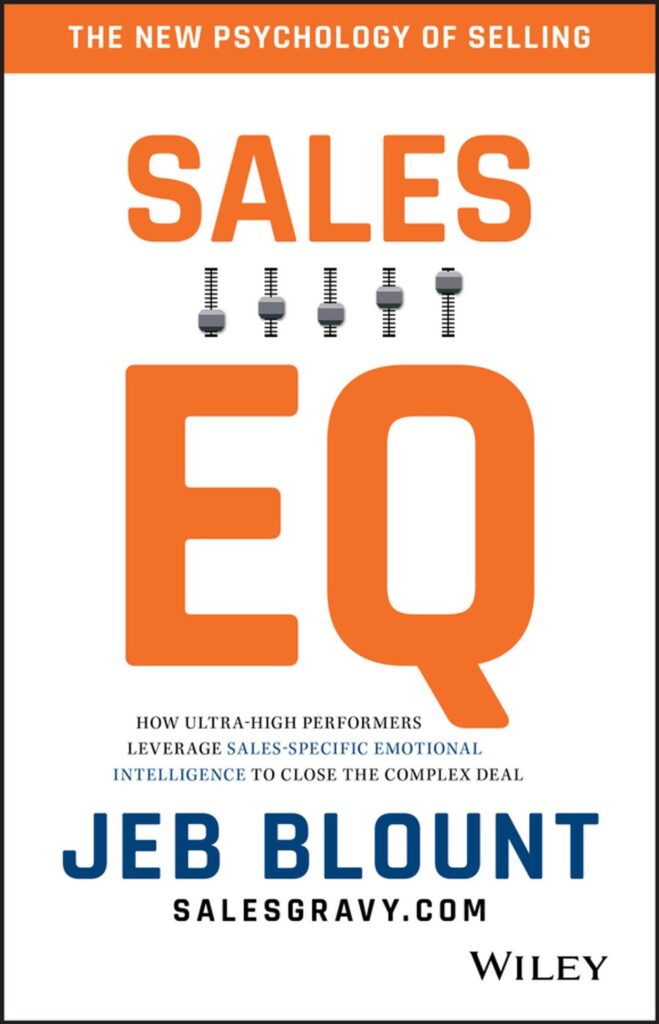Sharing my learnings from the book, Sales EQ by Jeb Blount
Sales EQ by Jeb Blount
In Sales EQ, Jeb Blount takes you on an unprecedented journey into the behaviors, techniques, and secrets of the highest earning salespeople in every industry and field. Sales EQ begins where The Challenger Sale, Strategic Selling, and Spin Selling leave off. It addresses the human relationship gap in the modern sales process at a time when sales organizations are failing because many salespeople have never been taught the human skills required to effectively engage buyers at the emotional level. Jeb Blount makes a compelling case that sales specific emotional intelligence (Sales EQ) is more essential to success than education, experience, industry awareness, product knowledge, skills, or raw IQ; and, sales professionals who invest in developing and improving Sales EQ gain a decisive competitive advantage in the hyper-competitive global marketplace.

- A sales professional is only as good as their last transaction. That’s why it’s so important to make every interaction with a buyer count
- The best salespeople think creatively to disrupt role expectations and score the deal.
- by speaking the same language as his buyer, he made the buyer feel understood – and gained his trust in the process.
- as a buyer, you’re much more irrational than you think. It’s our emotions, not logic, that influence our buying choices.
- people were more likely to buy stocks in a company whose name they could easily pronounce than in one with a more difficult name.
- to become an ultra high seller, you’ll need to appreciate how emotions influence the buying process. The challenge is that the salesperson and the customer experience the sales process differently.
- The salesperson leads from a position of logic before gradually moving toward a more emotional standpoint. For the buyer, the experience is the complete opposite. He leads with emotions.
- we experience emotional distress when our actions are inconsistent or when we hear information that contradicts what we believe to be true. This distress is known as cognitive dissonance. You’ll make more sales if you reduce your prospect’s cognitive dissonance.
- When asking what a person likes about something, you activate their negativity bias. This bias refers to how the human brain is primed to pay more attention to negative attributes than positive ones. So, when you ask for positives about their vendor, you prepare them to start thinking about the negatives, too. This might still result in cognitive dissonance as they start complaining, but at least you didn’t create it!
- Ultra high performers have a formidable intellect! They also have something that’s equally important: empathy. They put themselves in the other person’s shoes to get a sense of what their prospect feels.
- Being aware of your empathy level is a good step in the right direction. And there’s an easy way to find where you naturally land. Just answer this question: If you encountered someone behaving badly, would you A) Blame her behavior on her situation – she’s just having a bad day – or B) Blame it on her innate personality – she’s simply a bad person? If you’re a naturally empathetic person, then you most likely answered A. That’s because empathetic folks tend to attribute other people’s behavior to situational circumstances.
- anyone’s behavior can quickly spiral out of control in a stressful environment. stressful situations cause your fight-or-flight response to kick in. When this happens, your adrenaline surges as a response to your body preparing to fight – or run from – the threat. Unfortunately, when your fight-or-flight mode switches on, the rational part of your brain, the neocortex, switches off. The answer lies in thorough preparation for every call, meeting, and pitch. It’s also good to be prepared for the very worst scenario in case the meeting heads in that direction. By preparing, you enter your sales interactions with a calmer mind and greater confidence.
- We buy more from people we like.
- research shows that we like people who are polite, upbeat, well-groomed, well-dressed, and quite confident
- there’s another factor that tends to get overlooked – we like people who listen.
- your prospects will pay very close attention to how trustworthy you seem. Once they’ve decided whether or not they like you, they’ll start to assess whether or not they can rely on you.
- building trust is a lot like building a wall. You do it brick by brick. It’s not about grand gestures; it’s about genuinely showing people, with every action, that you’re someone they can put their faith in.
- One of the most important things is to behave consistently.
- The thing about trust is that it’s not usually lost because someone makes a huge error of judgment. Instead, in most sales situations where trust collapses, it’s because too many bricks in the wall are missing. In other words, all your little mistakes add up.
- if you keep demonstrating that you can be relied on, then eventually your prospects will repay you – with trust and repeat business.


Leave a Reply